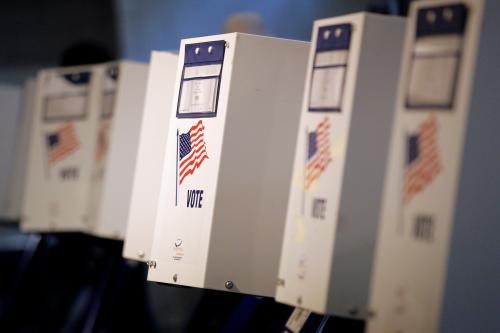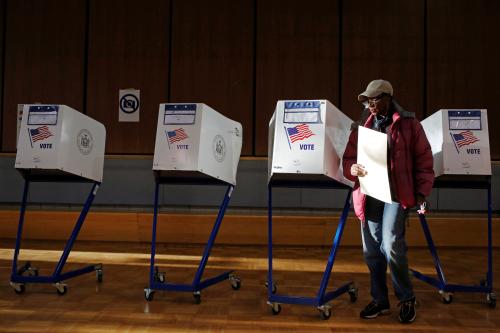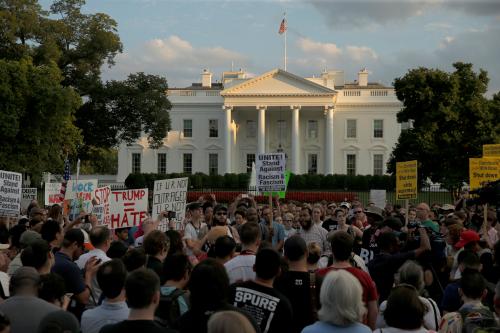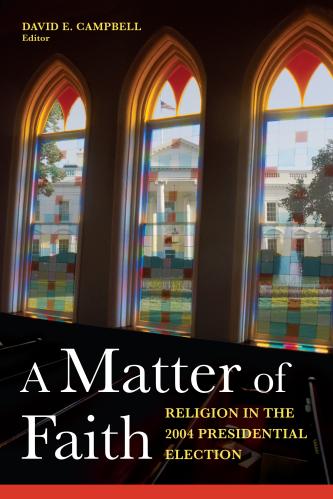African Americans have undergone a long and systemic attack on their voting rights, dating back to the late 1800s. This month, the Governance Studies program at Brookings hosted an event focused on the state of voting rights and the protection of the Voting Rights Act of 1965 (VRA) under the next Attorney General was the main takeaway.
The 2013 Supreme Court decision in Shelby County v. Holder effectively invalidated the preclearance provision, Section 5, of the VRA, making it easier for certain states—Alabama, Alaska, Arizona, Georgia, Louisiana, Mississippi, South Carolina, Texas, and Virginia—to change their voting laws without seeking federal approval. While Section 5 was not fully nullified per se, this is the first time in history that the responsibility of lawful compliance is at the discretion of previously covered jurisdictions that historically and systematically disenfranchised people of color.
While the Department of Justice (DOJ) still has the power to challenge these laws in court after the fact under Section 2 of the VRA—which authorizes the right to sue—litigating against discriminatory laws and practices is largely at the discretion of the nation’s Attorney General (AG) who sets the tone and agenda for voting rights policies.
As the nation completes the transition of power, the next AG pick will be more important than ever and the choice will determine whether we truly want to be a nation less divided.
President Trump’s nominee for Attorney General, Senator Jefferson Sessions III, has a troubling past with regard to voting rights. Opposing witnesses at Sessions’ confirmation hearings focused on his checkered legislative record on civil rights that potentially endangers the enforcement and even the sustainability of the remaining provisions of the VRA. Sessions’ own public statements contributed to these doubts, particularly his 2006 characterization of VRA legislation as “intrusive” and his applause for the adverse racial impact that the Shelby County v. Holder decision brought to the southern states, including his own county where the lawsuit was filed.
These statements call into question Sessions’ sincerity about defending the fundamental right to vote and the positioning of this issue as a bellwether for how he may approach other issues pertaining to civil rights and economic justice, including LGBTQ rights, immigration enforcement, and criminal justice reform.
Voting rights are still fundamental to citizenship
Southern states led the attack on voting rights after the emancipation of slaves and toward the end of the Reconstruction era around 1877. For example, Mississippi, which had at least 226 African Americans in public office prior to the end of Reconstruction, was one of the more aggressive states to restrict and eliminate these civil rights gains. In 1890, Mississippi’s state convention evaded the 14th and 15th Amendments and made it more difficult for blacks to vote by imposing discriminatory poll taxes, literacy tests, and “grandfather clauses.”
Leading up to the Voting Rights Act of 1965, the south supported “white primaries” that further suppressed black public opinion and input on their local schools, police, and courts. Discrimination at the polls was also found in the denial of credit, evictions, physical threats, and verbal abuse by white voting clerks when blacks sought to register, and later through white mob violence. By the 1940s, less than three percent of voting-age African American men and women in the South were registered to vote, resulting in southern legislatures being devoid of black representation.
By the time the modern Civil Rights Movement emerged in the 1950s, the quest for voting rights stood front and center with the fight for equal access to segregated facilities. Back then, a young John Lewis, now a 30-year U.S. congressman, was one of the many activists physically assaulted by police and angry white crowds in his walk from Selma to Montgomery, Alabama, on March 7, 1965, a day that would be remembered as Bloody Sunday. Crossing Selma’s Edmund Pettus Bridge, hundreds of protestors would send a message that voter suppression was no longer acceptable—a call to be recognized by former President Lyndon B. Johnson, who would sign the VRA into law.
Fast forward to June 25, 2013. After four congressional reauthorizations of the Act, the Supreme Court would conclude that the coverage formula in Section 4(b) of the VRA, which was used to determine the states and political subdivisions subject to Section 5, was unconstitutional. Writing that race relations had normalized since Jim Crow in his opinion, Chief Justice Roberts returned the nation back to its pre-1965 policy state.
What came out of the Shelby County v. Holder decision affected the most recent election through additional burdens imposed on historically disenfranchised voters, including strict voter ID requirements and changed or closed polling locations. Thus the authority granted under Section 5, which was designed to be more effective in challenging retrogressive voting regulations, was stripped from the VRA, leaving the right to initiate a lawsuit and trial as the most viable recourse to combat racial and other forms of discrimination.
Voter suppression after Shelby County v. Holder
During the 2016 election, more stringent photo identification requirements became the new “poll tax” for more than 21 million Americans, or 11 percent of the entire voting-eligible population without government-issued photo IDs. As a result, voting restrictions have extended beyond African Americans to other people of color, including Latinos, and Asian Americans, along with many seniors, students, and low-income citizens who do not possess, nor can readily obtain the selective forms of photo ID that states have chosen to accept.
States including Wisconsin and North Carolina, which President Obama won in 2008 and 2012, enacted tough voter restrictions in the 2016 election. Wisconsin’s Governor, Scott Walker, signed a stricter voter ID law in 2011. Although a federal court deemed parts of it unconstitutional, the law was allowed to go into effect before the most recent election after those parts had been modestly remedied. Nonetheless, as many as 300,000 people lacked the proper ID to participate, according to reports.
Just days following the Shelby County v. Holder decision, North Carolina eliminated same-day voter registration, cut a full week off early voting, barred voters from casting a ballot outside of their home precincts, got rid of straight ticket voting, and discarded a program to pre-register high school students who would turn 18 by Election Day. Although many of these restrictions were subsequently overturned after a federal court found that the intent was to suppress African American voters “with almost surgical precision,” the state still cut poll locations and their hours, contributing to longer lines that ultimately discouraged some working-class citizens from going to the polls. It has been reported that this suppression in North Carolina resulted in a nearly 9 percent drop in African American voter turnout.
Texas failed to accommodate about 608,000 voters—disproportionately African American and Latino—who faced hardships in obtaining critical identification documents. These discriminatory voting laws were passed by a Republican-dominant legislature without federal preclearance, and signed by then Gov. Rick Perry, who was nominated for U.S. Energy Secretary in the new administration.
Why the next Attorney General must protect voting rights
Sessions’ colleague Senator Cory Booker testified in opposition to the nominee at one of the confirmation hearings, noting that the role of the AG is not only the chief law enforcement officer of the United States, but also the leader who must “…pursue civil rights and equal protections for all in America.” In an unprecedented move, Senator Booker expressed his lack of confidence in Sessions’ ability to uphold the VRA and other equal protections if confirmed. Former Attorneys General Eric Holder and Loretta Lynch, both under President Obama, worked hard to protect this basic tenet of citizenship. Many voting rights advocates expect the next AG to not only follow suit, but also work to gain bipartisan support for the legislation’s sustainability.
Since the legislation’s inception, previous administrations have treated it as a bipartisan issue. Each of the four VRA reauthorizations was signed into law by a Republican president. And the most recent reauthorization of the legislation was done with bipartisan support by a 98-0 Senate vote and 390-33 vote in the House of Representatives in 2006. This was also at a time when Republicans controlled the White House and Congress.
Apathy or resistance toward the VRA can (and will) be interpreted as a break from this tradition, which is one of the many reasons why Sessions’ nomination is under attack by advocates.
With two separate pieces of legislation introduced in the 114th Congress to address the current state of voting rights by Representatives Jim Sensenbrenner (R-WI) and Terri Sewell (D-AL), the next AG will be forced to review these proposals, especially amid ongoing redistricting battles. The incoming AG will also need to consider options on how to employ Section 2 more aggressively in the absence of preclearance. More important, how the AG approaches voting rights will be foundational to his handling of other equal protections.
With the nation deeply divided and voting rights laws going awry in certain state legislatures since the Shelby County decision, a measured and forward-leaning guardian of these rights is required. Moving forward, the next four years will either be a wrinkle in time for voting rights or they will mark the erosion of a fundamental civil right.
The Brookings Institution is committed to quality, independence, and impact.
We are supported by a diverse array of funders. In line with our values and policies, each Brookings publication represents the sole views of its author(s).










Commentary
Voting rights, the next Attorney General, and a less divided America
January 23, 2017